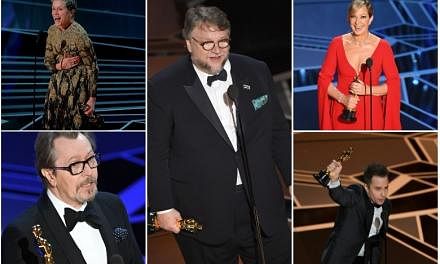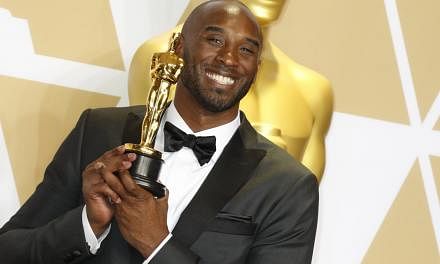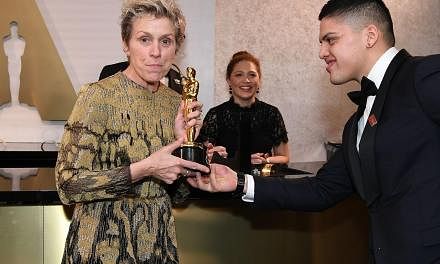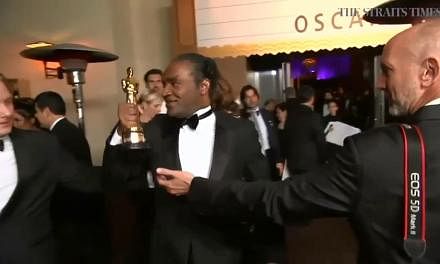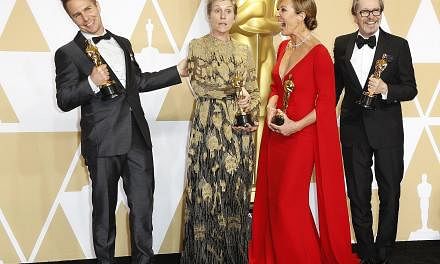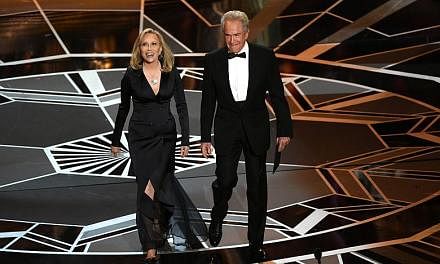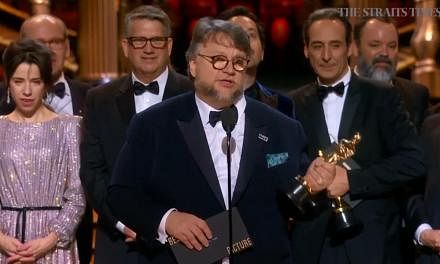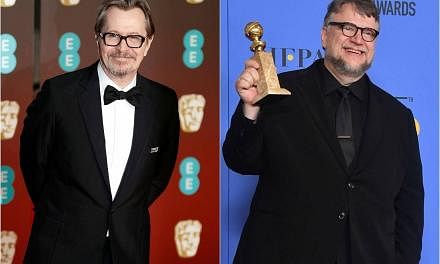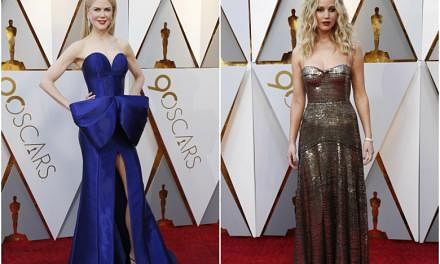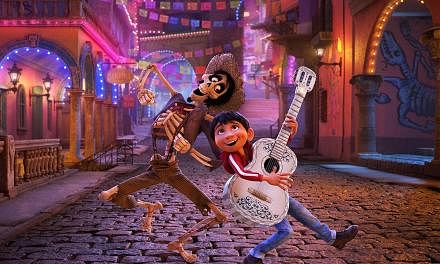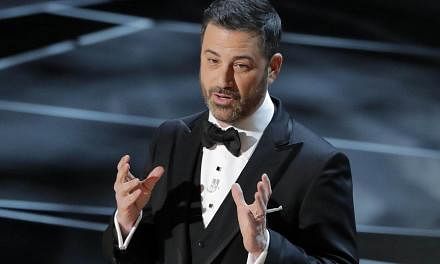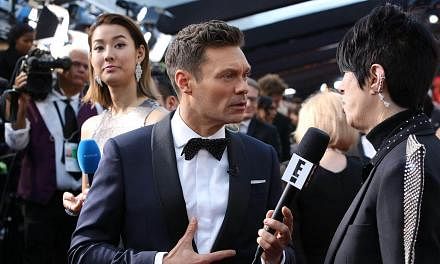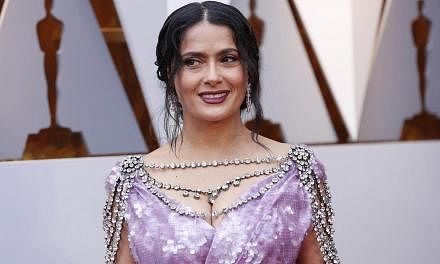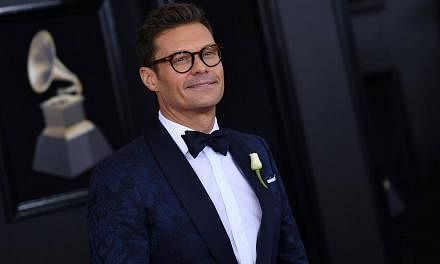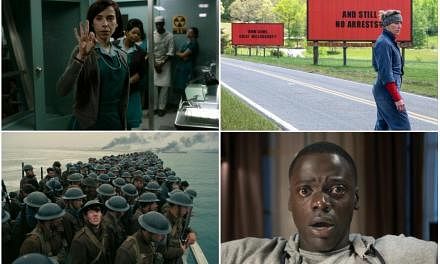Wondering which award-winning movies to catch in cinemas here? Check out the reviews before heading to the cinema.
The Shape Of Water review: Dive into this fantasy romance
REVIEW / FANTASY
THE SHAPE OF WATER (M18)
124 minutes/ 4 stars
The story: At the height of the Cold War in the 1960s, a top-secret project is under way at a laboratory where sanitation worker Elisa (Sally Hawkins) and her friend Zelda (Octavia Spencer) work. Despite warnings by operative Strickland (Michael Shannon) and scientist Dr Hoffstetler (Michael Stuhlbarg) to stay away, Elisa feels drawn to the water tank in which a mystery resides.
Sally Hawkins brings a combination of frailty and strength to her part in this movie that makes her performance the pillar on which everything else stands.
As Elisa, the cleaner robbed of her voice, but overflowing with expression, her performance breathes humanity into a picture that might otherwise have merely been an exercise in style, a fanboy's love letter to the monster movies of the 1950s.
Director and co-writer Guillermo del Toro's sets and art direction pay homage to classics of the creature feature genre, while filtering it through his own Latin American lens of magical realism. Elisa's workplace, for example, is a sterile zone of serious men doing serious Cold War work one minute and, in the next, it is a fantasy water park, a place where a woman and a monster might fall in love.
The Shape Of Water can be seen as a companion piece to del Toro's Crimson Peak (2015). Both see the story through the eyes of a woman whose love for her partner pulls her into strange, dangerous territory.

On the face of it, that structure could apply to dozens of other films, but what makes a del Toro film unique is the atmosphere: the way things look, move and, especially, how these are matched to the score.
The signature moments happen when things slow down, when the woman protagonist is mesmerised by a glimpse of the uncanny, followed by the suspense of never knowing if she will be murdered or find a friend.
Neither the Academy nor the Golden Globes had any love for Crimson Peak, yet The Shape Of Water has been given the most nominations for any film this year - 13, including a Best Actress nod for Hawkins.
The reason is that Crimson Peak was viewed as a big-budget work of mainstream horror, starring names such as Tom Hiddleston and Jessica Chastain, while The Shape Of Water's cast reads like an awards-draped list of actor's actors: Hawkins, Stuhlbarg, Spencer, Shannon and Richard Jenkins. All of them are excellent.
The central conceit of a beauty-and-beast romance is not new, but del Toro makes it fresh by staging it like a fantasy musical - neither male nor female can make words, but in the water, their dance says everything that needs to be said.
The Shape Of Water won Best Picture, Production Design and Original Score. Guillermo del Toro received an Oscar for Best Director.
Three Billboards Outside Ebbing, Missouri is a drama grounded in heartbreak
REVIEW / DRAMA
THREE BILLBOARDS OUTSIDE EBBING, MISSOURI (NC16)
117 minutes/ 4.5 stars

The story: Mildred Hayes (Frances McDormand), enraged that the rape-murder of her daughter has gone unsolved after several months, pays for billboards that announce the incompetency of her small town's police force. Chief Willoughby (Woody Harrelson) is annoyed, but does nothing. His deputy, Dixon (Sam Rockwell), decides to take action.
British-Irish screenwriter and director Martin McDonagh likes the realm where religion, murder, stupidity and silly jokes come out to play. Two hired killers hide out in Belgium in In Bruges (2008), but their pasts come to find them; and Seven Psychopaths (2012) has a screenwriter who becomes a target of mobsters after a beloved shih tzu is kidnapped.
His new movie is his most grounded and irony-free yet, featuring a family who suffers real heartbreak when one of their own is murdered.
At the recent Golden Globes, it won awards for Best Motion Picture (Drama) and two of its actors - McDormand and Rockwell - picked up awards for Best Actress and Best Supporting Actor respectively.
It is easy to see why. McDonagh is not a visually dazzling director. His background in theatre moves him to invest energy in longish scenes, animated by dialogue, giving actors plenty of room to stretch. Rockwell's Dixon is the McDonagh favourite: the idiot, who moves from delusion to clarity as the story progresses.
The film, however, belongs to McDormand as the wrathful mother, capable of conveying more menace with her steely gaze and set jawline than a dozen thugs waving weapons.
She, like her antagonist, the chief cop played by Harrelson, is wracked with guilt. Ebbing, Missouri, is too small a town to hold emotions as outsized as hers.
Mildred pays a price, but not before she extracts her own pound of flesh from the good townspeople of that otherwise sleepy burg.
Frances McDormand and Sam Rockwell won Best Lead Actress and Best Supporting Actor respectively.
Where the ice-skating villainess is portrayed as a victim
REVIEW / COMEDY BIOPIC
I, TONYA (M18)
120 minutes/ 4 stars
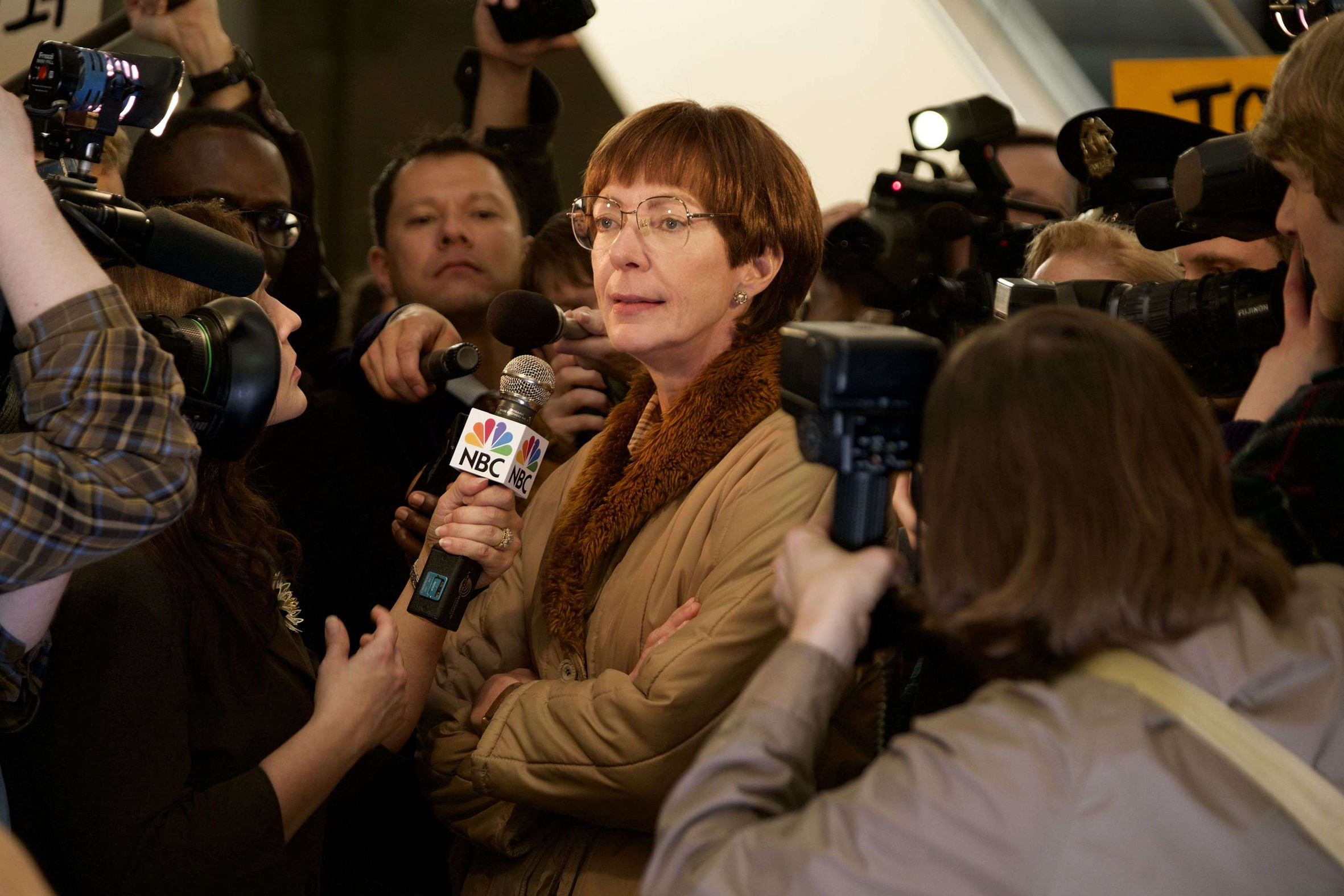
The story: Told in a series of vignettes, this biopic of a figure-skating Olympian who falls from grace begins in Tonya Harding's childhood. Her mother, Lavona (Allison Janney), places the child in her first skating class. The teen Tonya (Margot Robbie) meets and marries Jeff (Sebastian Stan) and the pairing of abusive man and woman with low self-esteem leads to disaster, namely, the assault on rival skater Nancy Kerrigan. It has Oscar nominations for Best Actress for Robbie and Supporting Actress for Janney.
The Tonya Harding scandal, when it broke in the early 1990s, was not as broadly covered in Singapore as it was in the United States, but it did get its share of column inches.
Most people would have forgotten the details and, if pressed, most would compress and conflate memories of the news that went into their heads to spin a story about a villainess, a talentless she-demon who orchestrated a vicious attack on a superior, more attractive rival to give herself better odds.
This movie, arranged as a series of mockumentary interviews, sets the record straight about the crime. It exonerates Harding.
But more interestingly, the interviews with Lavona (Janney) and Harding (Robbie) slowly and slyly expose the false memories that viewers might have about the incident.
It accuses the audience and the media of complicity in the crime of demonising Harding,
Robbie's Harding is a woman born of generational hardship. Her mother, who raised her, is a complicated mix of tiger mum and working-class eccentric.
Janney's portrayal of Lavona is fierce and funny, but clips of the real-life Lavona shown before the end credits reveal that Janney's portrayal was spot-on and not a caricature.
At its heart, this film asks its audience to accept a contradiction, which it sells with a knowing wink and rather successfully.
The court of public opinion should clear Harding's name, says the movie, because of the facts of the case.
But it does so by substituting one seductive narrative for another: She was a victim of a feckless, abusive husband, Jeff (Stan), whose story is played here as a Coen brothers-style crime caper about a dumb man, with even dumber friends.
Allison Janney won the Oscar for Best Supporting Actress.
An engaging portrait of a leader
REVIEW / BIOGRAPHICAL DRAMA
DARKEST HOUR (PG)
126 minutes/ 4 stars

The story: This portrait of British wartime prime minister Winston Churchill (Gary Oldman) covers the weeks between his rise to power and his famed "we shall fight on the beaches" speech in Parliament. As France falls to the Germans, a faction within the British government wants a peace treaty with Hitler, seeking to unseat the hawkish Churchill.
As sometimes happens in popular culture, a nostalgic nation becomes fixated on one period in its history. Victorian England has had its day in films and television, as has The Great War with its schoolboys swopping caps and cricket bats for helmets and rifles.
These days, the mood seems to be about Britain standing alone, with just the Channel protecting it from an existential danger lurking on the continent.
In a short span of time, there has been the Netflix royalty drama The Crown, Christopher Nolan's military re-enactment Dunkirk (2017) and the lesser-known biopic of the prime minister, Churchill (2017) with Brian Cox in the lead role.
Now comes this movie.
Gary Oldman's portrayal of Churchill deserves the acclaim it has received from critics, as well as the notice of judges at the Golden Globes and the Screen Actors Guild Awards. Both have nominated him for the Best Actor prize.
Oldman, unlike John Lithgow in The Crown or Brian Cox, is the physical opposite of the real wartime leader, who was as round and wide as Oldman is lean and narrow. Aided by the astonishingly supple facial prosthetics of the Oscar-nominated make-up artist Kazuhiro Tsuji, Oldman plays both the public and private Churchill with convincing ease.
The oratorical prowess is there, as well as the V-for-victory fingers and the brisk walk. But there is also Churchill naked in the bath, swilling brandy by the bucket, roaring at his terrified staff.
The dramatic build-up to the "we shall fight on the beaches" speech is finely constructed and Oldman's delivery of those words, time-worn as they are, raises the hairs and stirs the blood.
Director Joe Wright knows period drama, but in this and others he has helmed, such as Atonement (2007) and Anna Karenina (2012), his particular brilliance lies in turning inner thought into action cinema.
When it works, it works very well indeed. Wright shoots the prime minister in the act of speech-writing the same way Lee Ang might stage a wuxia battle. Wright's restless camera tracks Churchill's immortal words as they fly from his mind before landing on the pages of typist Miss Layton (Lily James). This is mental activity framed as martial arts.
Churchill's constant motion is a good fit for Wright's storytelling style, one that never tells when it can show. But it is a habit that can be taken to ludicrous extremes. There is a scene showing Churchill mingling with passengers in a London Underground carriage, gauging their support for war. It is a hackneyed, slow-clap man-of-the-people moment that mars this otherwise engaging portrait of a beloved national leader.
Gary Oldman received an Oscar for Best Lead Actor.

